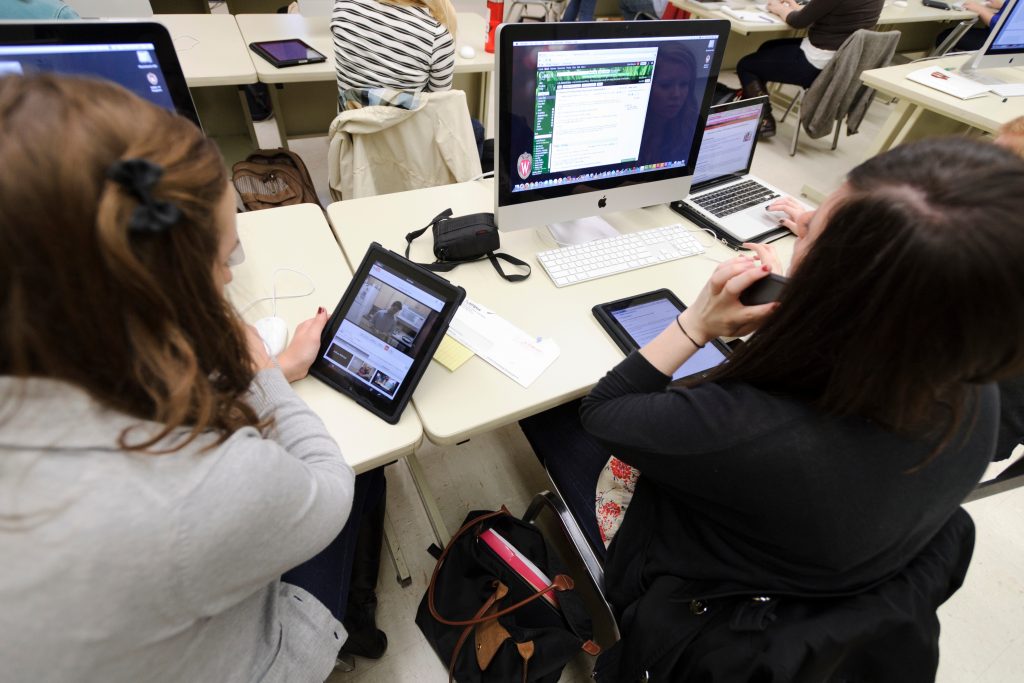
By Emily Knepple
In 2010, UW-Madison’s Digital Studies Certificate was created through a Madison Initiative for Undergraduates Grant. Founder and current director Rob Howard immediately began researching other programs across the country and saw the opportunity for UW-Madison to take on something new and unique.
“At the time, there weren’t that many working programs on digital studies,” said Howard. He said those involved with the formation of the program recognized the great existing courses that already focused on digital studies at the university. It was critical to those involved to pitch this certificate as something for students across all departments.
Many undergraduate students might already be proficient in certain aspects of the digital world. However, Howard believes the certificate offers insight into the technical side of things and allows students to engage more intimately with current technologies. One of the main pillars of the program is adaptation and being able to keep up with the changing digital landscape.
“We all have to look at a technology that’s constantly changing and adapt to it quickly, it’s all about the speed,” said Howard. “The hope is that students are able to identify these new technologies quickly and find more effective ways to use it.”
Zoe Klein, a junior studying Journalism & Mass Communication, echoed this sentiment.
“It’s very relevant,” said Klein, who completed the program last semester. “The Digital Studies Certificate is a strong aid to things like journalism and social media. It really does cover all of digital media holistically and it’s something that honestly everyone could benefit from.”
Howard says in the wake of COVID-19, he felt apprehensive about readjusting course layouts, a feeling shared across all of higher education. However, in a program where most of the content exists around the idea of adapting to current technology, the program was lucky to have active and engaged faculty who took on the challenge.
Since the transition, classes like Communication Arts 200: Introduction to Digital Communication have shifted more towards activity-based learning. Howard says the courses still follow principles of online learning, but continue to find new and innovative ways to keep students engaged.
So far, students in the program are happy with the way things have turned out and the faculty involved in the program are outlining the ways in which online learning can be a helpful tool in the future.
Since its initial offering in 2012, the program has continuously grown. There are currently more than 600 students in the program and around 150 graduate with the Digital Studies Certificate each year. Program Coordinator and Academic Advisor Amy Schultz shared it is currently the third biggest certificate offered on campus.
“Students in the program get to take classes that offer them hands-on practical experience that will prepare them for future professional opportunities,” said Schultz. “They’re learning different software, creating content like websites, videos, podcasts and more.”
Schultz works personally with students, helping them navigate the program and offering advice about possible majors and how to reach their professional goals. The students Schultz works with come from a variety of different departments, echoing the core goal of the program. “It’s interdisciplinary; it asks students: How has digital technology evolved? How can we use it across different disciplines?”
With people spending more time than ever before online, the Digital Studies Certificate program is a perfect fit for students curious about the role of technology in the present and the future. The resources offered through the program are preparing students to be adaptive, effective, creative thinkers in whatever field they pursue.
Learn more: https://digitalstudies.wisc.edu/
Digital Studies on Instagram: https://www.instagram.com/uwdigitalstudies/